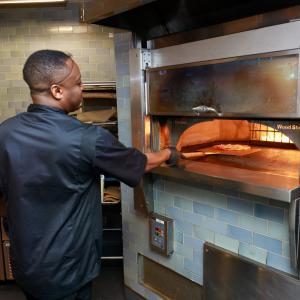After Three Reconstructive Open Heart Surgeries to Treat a Rare Congenital Condition, Sammie Taormina Doesn’t Let Anything Slow Him Down

Photo: Tony Luong
For a 5-year-old, Sammie Taormina has a very full schedule. He started kindergarten in September, but his extracurricular activities have not suffered one bit. He’s learning to swim, skateboard, and graduate from a scooter to a two-wheeler. He started playing soccer last spring, and his coach says he has real potential. “Sammie doesn’t let anything slow him down,” says his mom, Jessie. “We have to run to keep up with him.”
What makes Sammie’s zest all the more impressive is that he has had several open heart surgeries to treat a rare congenital condition known as hypoplastic left heart syndrome (HLHS). Dubbed “half a heart syndrome,” it leaves the left side of the heart so underdeveloped that it struggles to pump blood to the rest of the body. Thirty years ago, the survival rate for the approximately 960 babies born in the United States annually with HLHS was less than 5 percent. Today, thanks to a series of three reconstructive surgeries, the five-year survival rate has increased to 70 percent, with a 90 percent long-term survival rate for children who reach their first birthday.
In September 2018, Jessie, then a nurse at NYU Langone Hospital—Brooklyn, gave birth to Sammie at Tisch Hospital. He had his first heart operation 17 days later, followed by a second surgery in March 2019 and a third in September 2020. All the procedures were performed by Ralph S. Mosca, MD, MBA, now the Henry H. Arnhold Chair of Cardiothoracic Surgery and chief of the Division of Pediatric and Adult Congenital Cardiac Surgery at NYU Langone Health.
Dr. Mosca, one of the world’s top pediatric cardiac surgeons, helped define the modern-day surgical standard of care for patients with HLHS in the 1990s. Today, he heads one of the nation’s most successful programs for treating the disease, at Hassenfeld Children’s Hospital at NYU Langone. The hospital is the highest-ranked in New York State for pediatric cardiology and heart surgery, based on the national specialty ranking in the 2023–24 U.S. News & World Report’s “Best Children’s Hospitals” guide. The hospital is also recognized as one of the top 15 children’s hospitals in the nation for pediatric cardiology and heart surgery.
These distinctions are the latest in a growing number of accolades earned by Hassenfeld Children’s Hospital and its Pediatric Congenital Heart Program, which treats the most complex forms of such heart defects, including those that require a transplant, and performs nearly 250 operations annually. The program has the best risk-adjusted survival rate of any hospital in New York State for pediatric patients and stands among the best in the nation, according to the Society of Thoracic Surgeons and a report from the New York State Department of Health. The report takes into account the complexity of care at the time of surgery as well as the number of children treated for the condition at the institution.
“There is nothing more gratifying than to see how well children are doing after a major heart procedure, whether it’s a month or many years later,” says Dr. Mosca. Sammie now lives in Boston with his mom; his father, Nicolo; and his brother, Russell. Dr. Mosca and cardiologist Achiau Ludomirsky, MD, get to see him enjoying his childhood to the fullest in the photos Jessie sends them. “We’re so grateful for everything the team did for us,” says Jessie. “To watch him thrive is so amazing. Every day with Sammie is a gift.”

